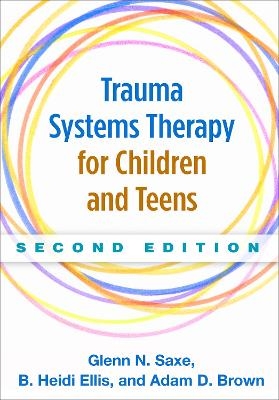
Trauma Systems Therapy for Children and Teens, Second Edition
Guilford Press (Verlag)
978-1-4625-2150-0 (ISBN)
New to This Edition
*Restructured to reflect significant conceptual and clinical advances.
*Even more clinician friendly: increased emphasis on practical aspects of assessment and treatment.
*Chapter on organizational planning.
*Chapters on TST innovations, including applications for diverse trauma populations and for problems other than trauma.
*More reproducible clinical tools--now downloadable.
Glenn N. Saxe, MD, is the Arnold Simon Professor and Chair of the Department of Child and Adolescent Psychiatry at New York University (NYU) School of Medicine and Director of the NYU Child Study Center. Dr. Saxe is a physician-scientist with a focus on the psychiatric consequences of traumatic events in children and on factors that contribute to children’s risk and resilience in the face of adversity. He is the principal developer of trauma systems therapy (TST), which is currently used to guide clinical care in 14 states. He is also Director of the Center for Coordinated Trauma Services in Child Welfare, a National Child Traumatic Stress Network academic center funded to improve trauma services for the nation’s child welfare systems. B. Heidi Ellis, PhD, is Assistant Professor of Psychiatry at Harvard Medical School and Boston Children's Hospital. She is also Director of the Refugee Trauma and Resilience Center at Boston Children's Hospital, a partner in the National Child Traumatic Stress Network. Dr. Ellis's primary focus is understanding how trauma and sociocultural contexts affect the mental health and development of youth, and translating this understanding into mental health and/or violence prevention intervention programs. She is the codeveloper of TST and oversees the adaptation and implementation of the model with refugee youth. Adam D. Brown, PsyD, is Clinical Assistant Professor in the Department of Child and Adolescent Psychiatry at NYU School of Medicine. He is also the clinical coordinator of the trauma service at the NYU Child Study Center. At NYU, he directs training, consultation, and technical assistance in TST. Dr. Brown has overseen programs for youth in inpatient, day treatment, and residential settings, and has extensive training and expertise in the area of assessing and treating interpersonal trauma in children and adolescents. He has a focused interest in the complex interplay between traumatized youth and families, the people who provide care to these youth and families, and the systems that contain this care.
1. Introduction to TST
I. Foundations
2. Survival Circuits
3. The Regulation of Survival-in-the-Moment States
4. The Social Environment and the Services System
5. Safety Signals
II. Getting Started
6. Ten Treatment Principles
7. The Treatment Team
8. Organizing Your Program
III. Doing TST
9. Assessment
10. Treatment Planning
11. Ready–Set–Go
12. Safety-Focused Treatment
13. Regulation-Focused Treatment
14. Beyond Trauma Treatment
15. Psychopharmacology
IV. Improving TST
16. Democratizing TST
17. Extending TST Beyond Trauma
18. Conclusions
| Erscheint lt. Verlag | 21.12.2015 |
|---|---|
| Verlagsort | New York |
| Sprache | englisch |
| Maße | 178 x 254 mm |
| Gewicht | 1088 g |
| Themenwelt | Geisteswissenschaften ► Psychologie ► Entwicklungspsychologie |
| Geisteswissenschaften ► Psychologie ► Persönlichkeitsstörungen | |
| Geisteswissenschaften ► Psychologie ► Traumatherapie | |
| Medizin / Pharmazie ► Medizinische Fachgebiete ► Pädiatrie | |
| Medizin / Pharmazie ► Medizinische Fachgebiete ► Psychiatrie / Psychotherapie | |
| Pflege ► Fachpflege ► Neurologie / Psychiatrie | |
| Medizin / Pharmazie ► Studium | |
| Sozialwissenschaften ► Soziologie | |
| ISBN-10 | 1-4625-2150-9 / 1462521509 |
| ISBN-13 | 978-1-4625-2150-0 / 9781462521500 |
| Zustand | Neuware |
| Haben Sie eine Frage zum Produkt? |
aus dem Bereich


